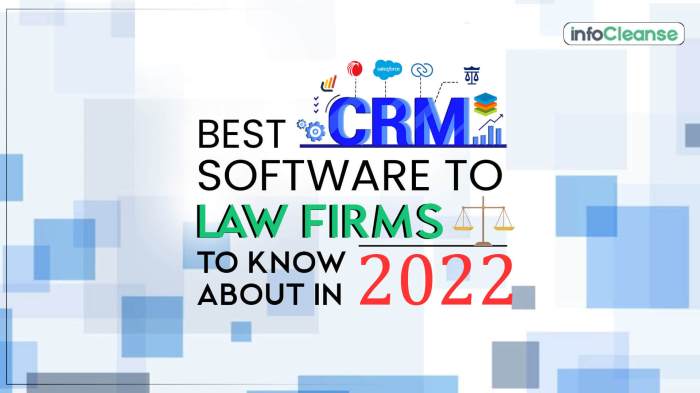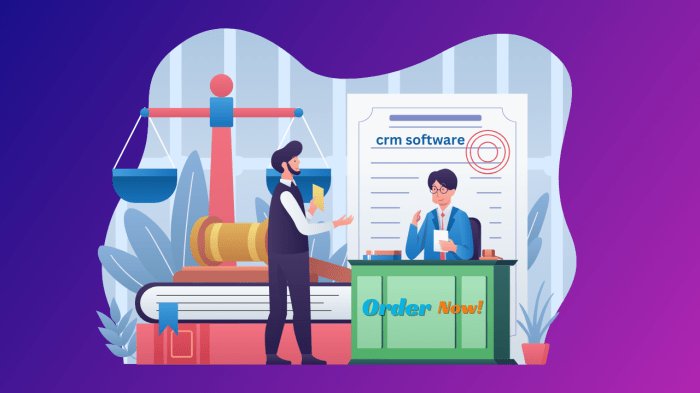Best CRM software for law firms is crucial for streamlining operations and enhancing client relationships. Efficient case management, improved communication, and better client retention are all key benefits. Choosing the right system depends on the firm’s size, specific needs, and budget, considering factors like ease of use, integration capabilities, and security features. This exploration will help law firms navigate the options and select the ideal CRM solution.
Many CRMs offer specialized features tailored to the legal industry, such as contact management with conflict-of-interest checks, matter management tools, and billing integration. Understanding these features is vital to optimizing workflow and maximizing efficiency. The right CRM can transform a law firm’s operational efficiency, leading to improved profitability and client satisfaction.

Source: infocleanse.com
Choosing the right Customer Relationship Management (CRM) software is crucial for law firms of all sizes. A robust CRM system streamlines operations, improves client communication, enhances case management, and ultimately boosts profitability. This detailed guide explores the best CRM software options specifically designed to meet the unique needs of legal professionals, offering a comprehensive overview to help you make an informed decision.
Understanding the Needs of Law Firms: Why a Specialized CRM is Essential
Law firms face unique challenges that general-purpose CRMs often fail to address. These include stringent data security requirements, the need for robust case management features, time tracking capabilities, and compliance with legal regulations like GDPR and CCPA. A specialized legal CRM offers features tailored to these specific needs, leading to improved efficiency and reduced administrative burden. Key considerations include:
- Secure Data Storage and Access Control: Client confidentiality is paramount. The CRM must offer robust security features, including encryption, access controls, and audit trails.
- Matter Management: Efficiently track cases, deadlines, and communications related to each client matter.
- Time Tracking and Billing: Accurate time tracking is essential for accurate billing and profitability analysis. Integration with billing software is highly desirable.
- Document Management: Centralized storage and easy access to all relevant documents for each case.
- Client Communication: Seamless communication tools, including email integration, client portals, and potentially even integrated video conferencing.
- Compliance and Reporting: The CRM should help maintain compliance with relevant legal regulations and generate reports for performance analysis.
Top CRM Software Options for Law Firms
The market offers several excellent CRM solutions catering to law firms. Here’s a closer look at some of the leading contenders, highlighting their strengths and weaknesses:
1. Clio Manage, Best crm software for law firms
Clio Manage is a popular choice, known for its user-friendly interface and robust feature set. It excels in matter management, time tracking, and billing, and offers strong integration capabilities. Its client portal facilitates secure communication and document sharing. However, it can be relatively expensive compared to some alternatives.

Source: rekalltech.com
2. MyCase
MyCase provides a comprehensive solution, integrating case management, communication, billing, and document management. It’s praised for its intuitive design and ease of use, making it suitable for firms of all sizes. Its pricing is generally competitive, and it offers excellent customer support.

Source: mcstarters.com
3. PracticePanther
PracticePanther is another strong contender, focusing on simplifying legal practice management. It boasts a clean interface, robust time tracking, and streamlined billing features. Its reporting capabilities are also highly regarded. It’s a good option for smaller firms looking for a balance of features and affordability.
4. CaseFox
CaseFox is a cloud-based CRM tailored to law firms, emphasizing ease of use and affordability. It offers core features such as contact management, calendar scheduling, and document storage. While it might lack some advanced features found in other CRMs, its simplicity makes it a good entry-level option.
Selecting the best CRM software for law firms requires careful consideration of various factors. A key aspect is finding a system that seamlessly manages client interactions and legal processes. For comprehensive information and options, explore resources dedicated to this topic, such as the guide available at crm software for law firms. Ultimately, choosing the best CRM software will significantly enhance your firm’s efficiency and client management capabilities.
5. CosmoLex
CosmoLex is a comprehensive legal practice management software that includes CRM functionalities. It is known for its robust features, including integrated billing, time tracking, and trust accounting. It’s a good choice for larger firms with complex needs, but its pricing reflects its advanced capabilities.
Choosing the Right CRM: Factors to Consider
Selecting the best CRM for your law firm requires careful consideration of several factors:
- Firm Size and Structure: A small solo practice will have different needs than a large corporate law firm.
- Budget: CRM software pricing varies significantly, so establish a clear budget beforehand.
- Features and Functionality: Prioritize the features most critical to your firm’s operations.
- Integration Capabilities: Ensure seamless integration with existing software, such as accounting and email systems.
- Scalability: Choose a CRM that can grow with your firm.
- User-Friendliness: The CRM should be intuitive and easy for your staff to use.
- Customer Support: Reliable customer support is crucial for resolving any issues promptly.
Implementing and Managing Your CRM
Successful CRM implementation requires careful planning and execution. This includes:
- Data Migration: Transferring existing client data to the new system accurately and efficiently.
- Training: Providing adequate training to your staff on how to use the CRM effectively.
- Customization: Tailoring the CRM to your firm’s specific workflows and processes.
- Ongoing Maintenance: Regularly updating and maintaining the CRM to ensure optimal performance.
Frequently Asked Questions (FAQ)
- Q: What is the average cost of legal CRM software? A: Pricing varies widely depending on the features and the number of users. Expect to pay anywhere from a few hundred dollars per month to several thousand.
- Q: Are legal CRMs secure? A: Reputable legal CRMs prioritize data security and employ robust measures to protect client information. Look for features like encryption, access controls, and audit trails.
- Q: How long does it take to implement a legal CRM? A: Implementation time varies depending on the size of your firm and the complexity of the system. It can range from a few weeks to several months.
- Q: Can I integrate my existing accounting software with a legal CRM? A: Many legal CRMs offer integration with popular accounting software. Check the software’s compatibility before making a decision.
- Q: What are the key benefits of using a CRM for a law firm? A: Key benefits include improved client communication, streamlined case management, enhanced efficiency, better time tracking and billing, and improved overall profitability.
Conclusion
Selecting the right CRM is a significant investment for any law firm. By carefully considering your firm’s specific needs and evaluating the various options available, you can find a solution that enhances efficiency, improves client relationships, and ultimately drives success. Remember to prioritize security, user-friendliness, and integration capabilities when making your decision.
References
Call to Action
Ready to streamline your law firm’s operations and enhance client relationships? Explore the CRM options discussed above and choose the one that best fits your needs. Start your free trial today and experience the difference!
Ultimately, selecting the best CRM software for a law firm requires careful consideration of individual needs and priorities. By evaluating features, scalability, and integration capabilities, firms can find a solution that streamlines operations, improves client relationships, and contributes to overall success. The investment in a well-chosen CRM system is an investment in the future efficiency and profitability of the firm.
FAQ Insights: Best Crm Software For Law Firms
What are the typical costs associated with CRM software for law firms?
Costs vary widely depending on the software, features, and number of users. Expect a range from affordable monthly subscriptions to more substantial upfront investments for enterprise-level solutions. Some providers offer tiered pricing based on functionality.
How can I ensure my chosen CRM software is secure and compliant with data privacy regulations?
Look for software with robust security features, such as encryption, access controls, and regular security audits. Ensure the provider is compliant with relevant data privacy regulations like GDPR or CCPA. Request information on their security protocols and certifications.
What is the typical implementation timeline for a new CRM system?
Implementation time varies greatly depending on the complexity of the system, the size of the firm, and the level of customization required. Expect anywhere from a few weeks to several months for a complete rollout and user training.
Can I integrate my existing legal software with a new CRM?
Many CRMs offer integration capabilities with other legal software applications. Check for compatibility with your existing systems before making a decision. API integrations are common, allowing seamless data transfer.
